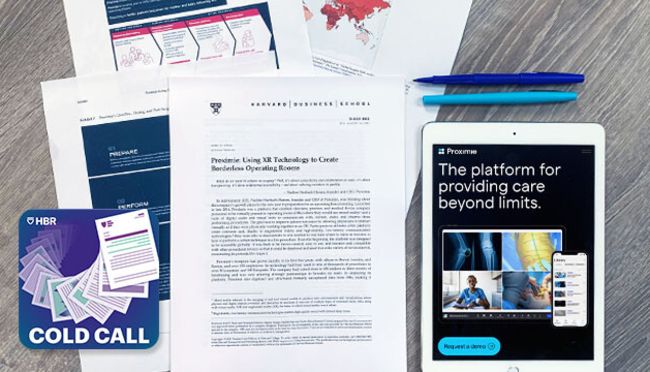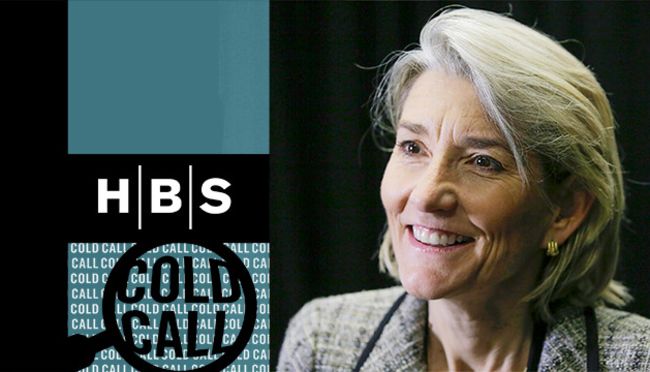
- 12 Sep 2023
- Cold Call Podcast
Can Remote Surgeries Digitally Transform Operating Rooms?
Launched in 2016, Proximie was a platform that enabled clinicians, proctors, and medical device company personnel to be virtually present in operating rooms, where they would use mixed reality and digital audio and visual tools to communicate with, mentor, assist, and observe those performing medical procedures. The goal was to improve patient outcomes. The company had grown quickly, and its technology had been used in tens of thousands of procedures in more than 50 countries and 500 hospitals. It had raised close to $50 million in equity financing and was now entering strategic partnerships to broaden its reach. Nadine Hachach-Haram, founder and CEO of Proximie, aspired for Proximie to become a platform that powered every operating room in the world, but she had to carefully consider the company’s partnership and data strategies in order to scale. What approach would position the company best for the next stage of growth? Harvard Business School associate professor Ariel Stern discusses creating value in health care through a digital transformation of operating rooms in her case, “Proximie: Using XR Technology to Create Borderless Operating Rooms.”

- 07 Jan 2019
- Research & Ideas
The Better Way to Forecast the Future
We can forecast hurricane paths with great certainty, yet many businesses can't predict a supply chain snafu just around the corner. Yael Grushka-Cockayne says crowdsourcing can help. Open for comment; 0 Comments.

- 04 May 2017
- Cold Call Podcast
Leading a Team to the Top of Mount Everest
In a podcast, Amy Edmondson describes how students learn about team communication and decision making by making a simulated climb up Mount Everest. Open for comment; 0 Comments.
- 15 Mar 2017
- Lessons from the Classroom
More Than 900 Examples of How Climate Change Affects Business
MBA students participating in Harvard Business School’s Climate Change Challenge offer ideas on how companies can negate impacts from a changing environment. Open for comment; 0 Comments.
- 04 Sep 2013
- What Do You Think?
How Relevant is Long-Range Strategic Planning?
Summing Up: Jim Heskett's readers argue that long-range planning, while necessary for organizational success, must be adaptable to the competitive environment. What do YOU think? Open for comment; 0 Comments.
- 16 Jul 2012
- Research & Ideas
Are You a Strategist?
Corporate strategy has become the bailiwick of consultants and business analysts, so much so that it is no longer a top-of-mind responsibility for many senior executives. Professor Cynthia A. Montgomery says it's time for CEOs to again become strategists. Closed for comment; 0 Comments.
- 21 Dec 2011
- Research & Ideas
The Most Common Strategy Mistakes
In the book, Understanding Michael Porter: The Essential Guide to Competition and Strategy, Joan Magretta distills Porter's core concepts and frameworks into a concise guide for business practitioners. In this excerpt, Porter discusses common strategy mistakes. Closed for comment; 0 Comments.
- 09 May 2011
- Research & Ideas
Moving From Bean Counter to Game Changer
New research by HBS professor Anette Mikes and colleagues looks into how accountants, finance professionals, internal auditors, and risk managers gain influence in their organizations to become strategic decision makers. Key concepts include: Many organizations have functional experts who have deep knowledge but lack influence. They can influence high-level strategic thinking in their organizations by going through a process that transforms them from "box-checkers" to "frame-makers." Frame-makers understand how important it is to attach the tools they create to C-level business goals, such as linking them to the quarterly business review. Frame-makers stay relevant by becoming personally involved in the analysis and interpretation of the tools they create. Open for comment; 0 Comments.
- 02 Jun 2010
- What Do You Think?
How Do You Weigh Strategy, Execution, and Culture in an Organization’s Success?
Summing up: Respondents who ventured to place weights on the determinants of success gave the nod to culture by a wide margin, says HBS professor Jim Heskett. (Online forum now closed. Next forum opens July 2.) Closed for comment; 0 Comments.
- 22 Mar 2010
- Research & Ideas
One Strategy: Aligning Planning and Execution
Strategy as it is written up in the corporate playbook often becomes lost or muddled when the team takes the field to execute. In their new book, Professor Marco Iansiti and Microsoft's Steven Sinofsky discuss a "One Strategy" approach to aligning plan and action. Key concepts include: The book combines practical experience at Microsoft with conceptual frameworks on how to develop strategies that are aligned with execution in a rapidly changing competitive environment. "Strategic integrity" occurs when the strategy executes with the full, aligned backing of the organization for maximum impact. The chief impediment to strategy execution is inertia. The One Strategy approach is less about formal reviews and more about one-on-one conversation. Blogs can be a powerful asset in managing an organization. Closed for comment; 0 Comments.
- 11 Aug 2008
- Research & Ideas
Strategy Execution and the Balanced Scorecard
Companies often manage strategy in fits and starts, with strategy execution lost along the way. A new book by Balanced Scorecard creators Robert S. Kaplan and David P. Norton aims to make strategy a continual process. Key concepts include: An excellent strategy often fades from memory as the organization tackles day-to-day operations issues. The operational plan and budget should be driven from the revenue targets in the strategic plan. The senior management team needs to have regular, probably monthly, meetings that focus only on strategy. The Office of Strategy Management is a small cadre of professionals that orchestrate strategy management processes for the executive team. Closed for comment; 0 Comments.
- 11 Apr 2007
- Research & Ideas
Adding Time to Activity-Based Costing
Determining a company's true costs and profitability has always been difficult, although advancements such as activity-based costing (ABC) have helped. In a new book, Professor Robert Kaplan and Acorn Systems' Steven Anderson offer a simplified system based on time-driven ABC that leverages existing enterprise resource planning systems. Key concepts include: The activity-based costing system developed in the 1980s fell out of favor for a number of reasons, including the need for lengthy employee interviews and surveys to collect data. The arrival of enterprise resource planning systems allows crucial data to be pumped automatically into a TDABC system. Managers must answer two questions to build an effective TDABC system: How much does it cost to supply resource capacity for each business process in our organization? How much resource capacity (time) is required to perform work for each of our company's transactions, products, and customers? Profit improvements of up to 2 percent of sales generally come in less than a year. Closed for comment; 0 Comments.
- 24 Apr 2006
- Research & Ideas
Managing Alignment as a Process
"Most organizations attempt to create synergy, but in a fragmented, uncoordinated way," say HBS professor Robert S. Kaplan and colleague David P. Norton. Their new book excerpted here, Alignment, tells how to see alignment as a management process. Closed for comment; 0 Comments.
- 02 Feb 2004
- Research & Ideas
Mapping Your Corporate Strategy
From the originators of the Balanced Scorecard system, Strategy Maps is a new book that explores how companies can best their competition. A Q&A with Robert S. Kaplan. Closed for comment; 0 Comments.
- 12 Oct 1999
- Research & Ideas
A Perfect Fit: Aligning Organization & Strategy
Is your company organizationally fit? HBS Professor Michael Beer believes business success is a function of the fit between key organizational variables such as strategy, values, culture, employees, systems, organizational design, and the behavior of the senior management team. Beer and colleague Russell A. Eisenstat have developed a process,termed Organizational Fitness Profiling, by which corporations can cultivate organizational capabilities that enhance their competitiveness. Closed for comment; 0 Comments.

Can Sustainability Drive Innovation at Ferrari?
When Ferrari, the Italian luxury sports car manufacturer, committed to achieving carbon neutrality and to electrifying a large part of its car fleet, investors and employees applauded the new strategy. But among the company’s suppliers, the reaction was mixed. Many were nervous about how this shift would affect their bottom lines. Professor Raffaella Sadun and Ferrari CEO Benedetto Vigna discuss how Ferrari collaborated with suppliers to work toward achieving the company’s goal. They also explore how sustainability can be a catalyst for innovation in the case, “Ferrari: Shifting to Carbon Neutrality.” This episode was recorded live December 4, 2023 in front of a remote studio audience in the Live Online Classroom at Harvard Business School.